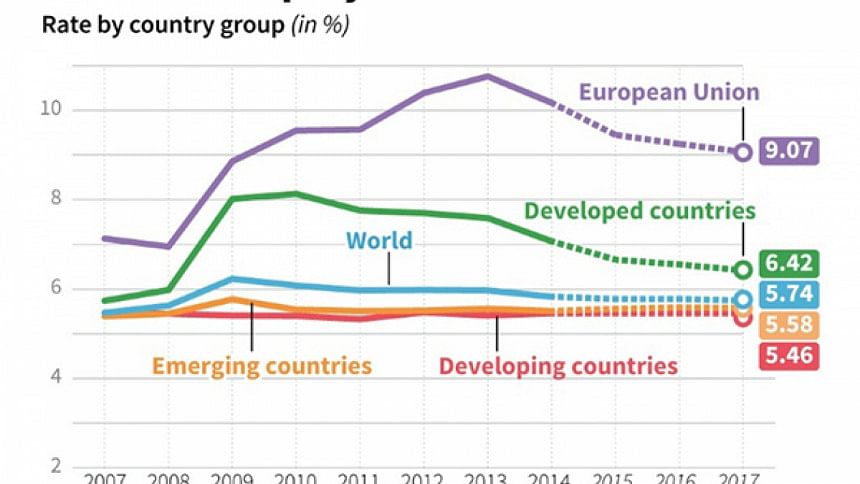Global unemployment set to rise through 2017: ILO

In a new report, the ILO estimated that 197.1 million working-age people were unemployed in 2015, an uptick of 0.7 percent compared to 2014 figures.
In 2016, the figure is expected to rise by a further 2.3 million, with another 1.1 million people added to the jobless roster in 2017, the report said.
The figures also made clear that employment rates have not recovered from the financial crash of 2008, as 27 million more people were out of work last year as compared to the pre-crisis level.
"The global economy is not generating enough jobs," ILO chief Guy Ryder told journalists.

He pointed to "the significant slowdown in emerging markets coupled with a sharp decline in commodity prices", as the culprits fuelling a grim outlook for the global job market.
The report said that much of the trouble in the developing world stems from struggling Brazil and especially China, which last year saw its slowest GDP growth in a quarter century.
Once key drivers of global job growth, major emerging economies in Asia and Latin America will likely see unemployment rise this year, as will Arab and African nations heavily reliant on commodity sales, according to the report.
Unemployment is expected to fall slightly in advanced economies, but not by enough to fully offset the losses in the developing world, the ILO said.
The report forecasts that in the United States and some other advanced economies, "unemployment will decline to pre-crisis rates."
'VULNERABLE EMPLOYMENT'
The ILO sounded specific alarm on the ever-rising numbers of people worldwide who have "vulnerable employment", a term referring to low quality, unstable work, without formal contracts or benefits and with huge volatility in compensation.
In addition to jobless figures, the ILO has typically used the vulnerable employment rate to assess the true health of an economy.
In emerging markets, the number of people with vulnerable work is expected to grow by 25 million over the next three years, the report said.
"Poor job quality remains a pressing issue worldwide," it added.
Already, 74 percent of workers in Southern Asia and 70 percent in sub-Saharan Africa have vulnerable work, with the global figure at 46 percent, or 1.5 billion people.
Ryder noted that opinion was previously divided on the merits of informal labour, with some suggesting that, despite the lack of contracts and stability, an abundance of informal workers was reflective of economic dynamism and associated with an emerging market on the rise.
But from the ILO's perspective, the debate has been settled, Ryder told reporters, insisting that formalisation of the labour market "is the right path to take."
"The lack of decent jobs leads people to turn to informal employment, which is typically characterised by low productivity, low pay and no social protection," Ryder said in a statement. "This needs to change."

 For all latest news, follow The Daily Star's Google News channel.
For all latest news, follow The Daily Star's Google News channel. 








Comments